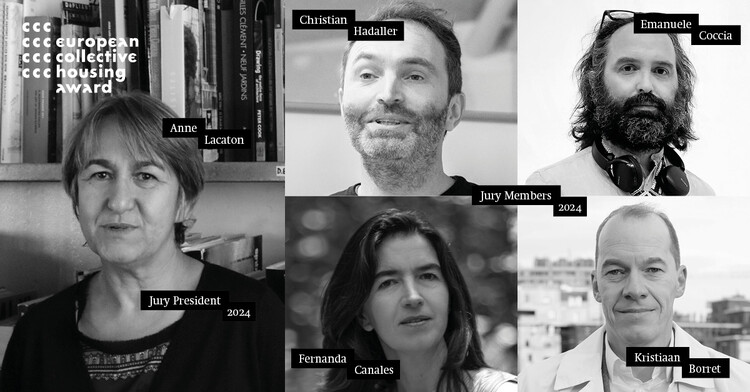
Architectural awards serve as a fundamental platform within the profession and the wider community. They recognize and celebrate outstanding achievements in architectural projects, promoting excellence and innovation, while also providing visibility and exposure for architects and companies, highlighting projects that might otherwise go unnoticed. This impact is particularly evident in collective housing projects, which face a range of challenges, from issues of cost and compliance with urban planning legislation to the need to create welcoming and functional environments for residents. By highlighting diverse initiatives and approaches, awards inspire and educate, stimulate dialogue and the exchange of ideas, and contribute significantly to the advancement of architecture by recognizing projects that address specific themes such as sustainability or social impact.
The recent announcement by the Basque Country Institute of Architecture and the Arc en Rêve Architecture Centre, backed by the Basque Government's Department of Spatial Planning, Housing and Transport, emphasizes the importance of awards by launching the first edition of the European Collective Housing Award. This initiative not only recognizes the relevance of collective housing in building sustainable and inclusive communities, but also highlights the importance of promoting architectural excellence in this field.
This award introduces collective housing as a main question in the architectural debate at a European level, claiming this type of housing as a sign of European identity, and in particular public housing as an essential part of the European welfare state, something we must defend. The architecture of housing is, along with the public space, the most important because both of them define our everyday lives. Influencing its quality means improving people's quality of life directly. - Pablo Garcia Astrain. Housing, Land And Architecture Directorate – Basque Government, Director
With a focus on inclusion, innovation and environmental responsibility, the award aims to highlight the crucial role of housing as a fundamental human need and a social good, honoring projects that not only demonstrate architectural ingenuity, but also leave a positive legacy in communities and contribute to sustainable urban development. European collective housing, rich in history and reflecting the continent's values, serves as testimony to its commitment to social cohesion, architectural innovation and sustainable urban development. Despite challenges such as stigmatization and urban crises, there is a renewed interest in collective housing that is in line with contemporary socio-environmental concerns. The award is aimed at all areas related to collective housing, from architecture and urban planning professionals to specialists in the construction sector, users or public administrations, and all will be able to present built projects, both public and private. Submissions remain open until May 7, inviting a wide range of professionals, including architects, urban planners, developers, and urbanism and housing enthusiasts, to share their contributions and experiences.

We believe that this award transcends the limits of the architectural practice, as across the majority of European countries, the question of housing has become a major social and political issue. In fact, not only the architects can apply for the award, but also the clients and the users. For centuries, the morphology of European cities has been determined by residential architecture, which is mostly collective. In a moment when new demands emerge—the fact that we work at home, for instance, or the impact of other usages of space due to immigration—and when access to affordable housing is more and more difficult, we thought it was fundamental to recenter the discourse around this theme. - Fabrizio Gallanti. Arc en Rêve, Director
Spanning 46 Council of Europe countries, the idea is to create a unique platform for individuals and companies to present their projects, which will be scrutinized by a renowned international jury made up of experts with diverse backgrounds, from experienced architects to government officials and contemporary thinkers. Led by Anne Lacaton, partner at Lacaton & Vassal and winner of the 2021 Pritzker Prize, the jury embodies the spirit of the prize by advocating excellence in the design of collective housing that is both aesthetically pleasing and socially responsible. Jurors also include Kristiaan Borret, renowned professor of urban design and maître architect of the Brussels-Capital Region; Emanuele Coccia, associate professor and thinker based in Paris; Fernanda Canales, architect known for her innovative projects; and Christian Hadaller, architect and co-founder/board member of a cooperative in Germany. Together, this panel embodies the spirit of the award, ensuring that the winning projects reflect both architectural excellence and a deep understanding of the social and environmental contexts in which they operate.
An architectural award is a way to point out good ARCHITECTURE. In this case, a housing building. So, besides all the characteristics included in a building, we seek to discover and underline good housing built cases. Thus, the points to be evaluated will be those related to the ordinary architecture discipline and its proper application to a housing case. As a non-exhaustive suggestion, the award's Advisory Board pointed out some points like typological innovation, environmental and social sustainability, construction methods, etc. In my point of view, all the awarded cases should represent a relevant urban case and provoke a positive social impact in the city. An appropriate construction logic and the way to manage the resources should also accompany an awarded case. - José Angel Medina Murua. Euskadiko Arkitektura Institutoa / Instituto de Arquitectura de Euskadi, Director
The European Collective Housing Award celebrates the architectural heritage of European cities and seeks to tackle pressing social challenges, such as the housing deficit, by promoting sustainable urban development practices. This initiative underlines a collective commitment to excellence in architectural design and equitable housing solutions. By catalyzing meaningful dialogue and action, the award seeks to shape the future of urban living on a continental scale, inspiring innovation and collaboration to create communities that are not only architecturally remarkable, but also socially inclusive and environmentally sustainable.
For more information on the award, visit the official website.

